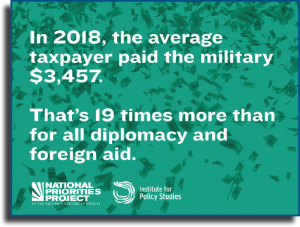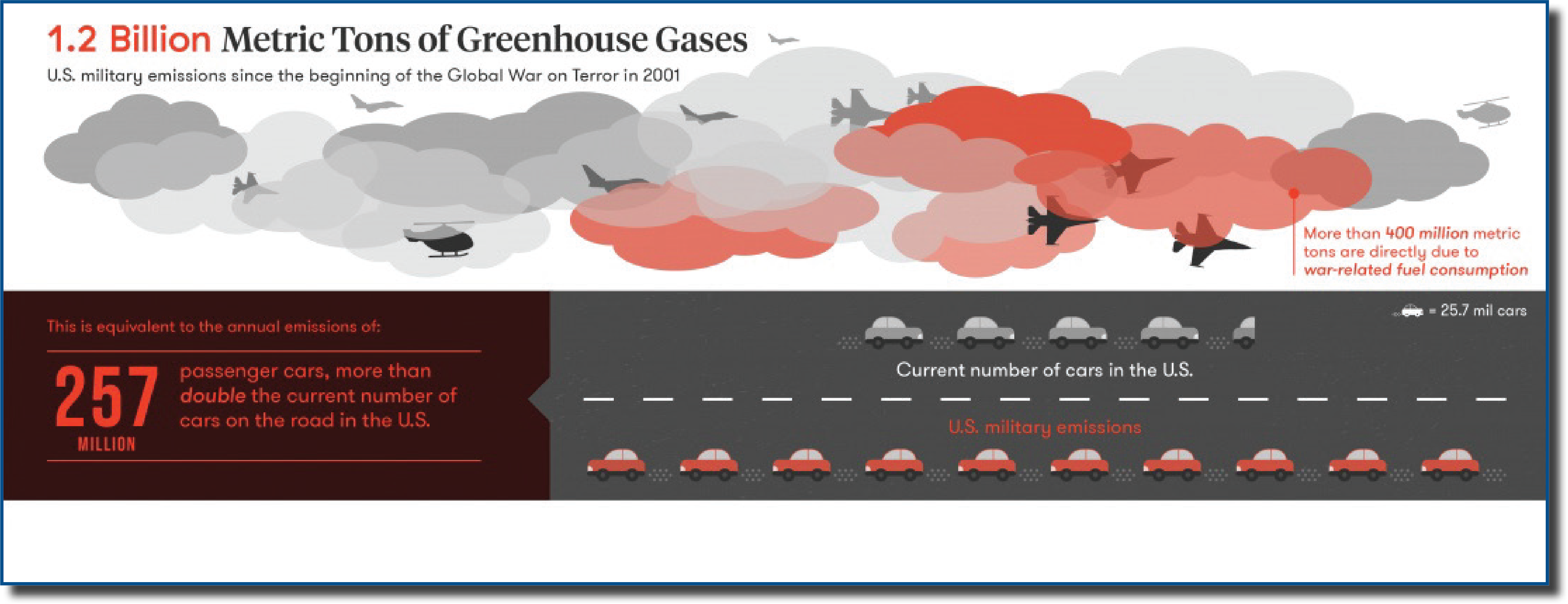A Progressive Foreign Policy Vision
- A Progressive Foreign Policy
- End Endless War
- Prioritize People Over the Bloated Pentagon Budget
- Reduce the Nuclear Threat
- Oppose War with Iran
- End War in Yemen
- Support Peace on the Korean Peninsula
- Oppose Intervention in Venezuela
- Prioritize Diplomacy
- Support Peace for Israel and Palestine
- Meet Climate Change Challenge

It should be plain to anyone to see that a paradigm shift in U.S. foreign policy is long overdue. Surveying today’s global landscape we see herculean challenge after herculean challenge: climate change, global inequality, violent extremism, and growing authoritarianism. Current U.S. policy, driven by outmoded thinking and special interest power, is myopically focused on the management of endless wars and spending trillions of dollars on wasteful weapons systems. Enough is enough. We need candidates that will champion a bold progressive foreign policy vision that can meet today’s global challenges.
Current U.S. foreign policy has been stuck in a rut, behaving as if military might is the privileged, go-to tool in the foreign policy toolbox. As one previous commander in chief, Barack Obama acknowledged “just because we have the best hammer does not mean every problem is a nail.” Imagine the immense resources that would be liberated for creative international problem solving if the lion’s share of our nation’s foreign policy spending, brainpower and political energy were no longer consumed by warfighting.
 The current paradigm hasn’t just been costly — it’s backfired. It has made us less safe by fueling violent extremism, alienating allies, and destabilizing entire regions. Meanwhile, creative diplomatic approaches and international cooperation to address challenges like nuclear proliferation and global tensions are woefully underfunded. We need a new foreign policy vision that reorders our foreign policy priorities to put diplomacy and international cooperation first.
The current paradigm hasn’t just been costly — it’s backfired. It has made us less safe by fueling violent extremism, alienating allies, and destabilizing entire regions. Meanwhile, creative diplomatic approaches and international cooperation to address challenges like nuclear proliferation and global tensions are woefully underfunded. We need a new foreign policy vision that reorders our foreign policy priorities to put diplomacy and international cooperation first.
A progressive foreign policy requires that we hold ourselves and our friends to the same standards that we hold our adversaries. It means working to create a foreign policy for everyone, not the interests of the military-industrial complex. Such a foreign policy should be grounded in human rights and true democracy, resisting the temptation to try to impose the will of the U.S. on others. We need a 21st century foreign policy to move us towards a world of peace, justice, equality, real security and environmental sustainability.
The following sections cover a host of issues, policies, and questions we believe candidates, policy makers, activists and voters should engage with as they set out to shape the course of history in this upcoming election. While far from comprehensive on matters of foreign policy, this platform covers issues that are both salient in the 2020 election and critical for advancing the new foreign policy vision our country needs.


Our nation has been fighting an endless, reckless, borderless war for a generation. Young adults who weren’t alive when Congress passed the 2001 war authorization are now enlisting in this ill-defined war. Hundreds of thousands of lives have been lost and the cost to taxpayers has been nearly $6 trillion. To put that number in perspective, the average U.S. taxpayer paid the military $3457 in 2018 alone. Despite these enormous costs, since 2001 deaths caused by acts of terrorism have increased dramatically.
The 2001 Authorization for the Use of Military Force, passed days after 9/11, has been used by three presidents to justify at least 41 military engagements in 19 countries. The threshold for the use of U.S. military force, a bar that’s been set too low for decades, has drifted to the point that most of us in the U.S. have no idea where our country is active militarily. It’s time we stop pretending we can bomb terrorism out of existence, especially at a time when 73.3% of all extremist-related fatalities in the U.S. over the last decade can be linked to domestic right-wing extremists. There is no far-flung nation we can bomb to grapple with the white supremiscist violence plaguing the U.S. today. We need to start addressing root causes of violent extremism at home and abroad. At the same time, we need Congress, not the president, to debate and decide when our nation wages war, as the Constitution mandates.
Action Steps for a Progressive Foreign Policy
- Support the withdrawal of troops from Afghanistan, Iraq, and Syria and an end to U.S. airstrikes throughout the greater Middle East.
- End the use of drones for extrajudicial killing, which has killed too many civilians and fueled extremist recruiting.
- Support Congress reclaiming its constitutional authority to debate and vote on war, first and foremost by repealing the outdated and overly broad 2001 and 2002 war authorizations.
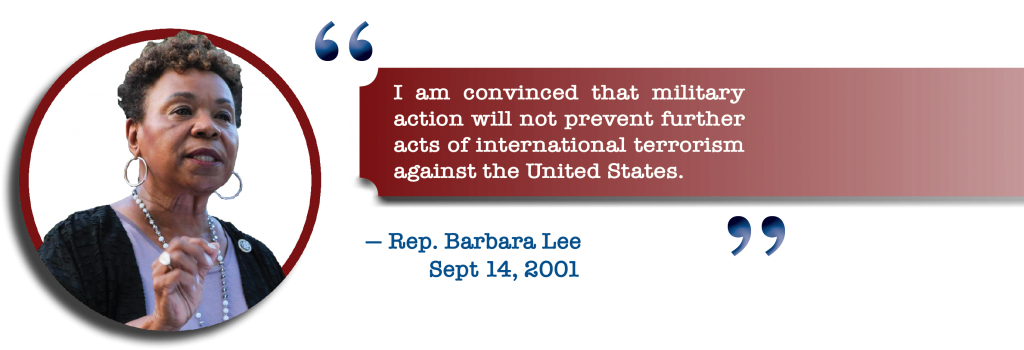
A Peace Voter’s Question for Candidates
Do you support an immediate and responsible withdrawal of U.S. forces from Iraq, Syria, and Afghanistan? What will you do to end the endless wars and to ensure that we will not stumble into new military conflicts?

Safety and security come in many forms. Our armed forces are there to protect our national security, but they are not the only form of defense we need. We need a fully funded State Department to support steadfast diplomacy to end old wars and prevent new ones. We need good paying jobs that offer economic security for ourselves and our families. We need affordable, quality healthcare that protects us from illness and injury, and affordable health insurance that shields us from the otherwise insurmountable costs of healthcare. We need education that protects our intellect and empowers us to shape our future for the better. We need investments in environmental infrastructure to help protect us from the coming storms of climate change, and in renewable energy sources to replace the fossil fuels that are destroying our planet.
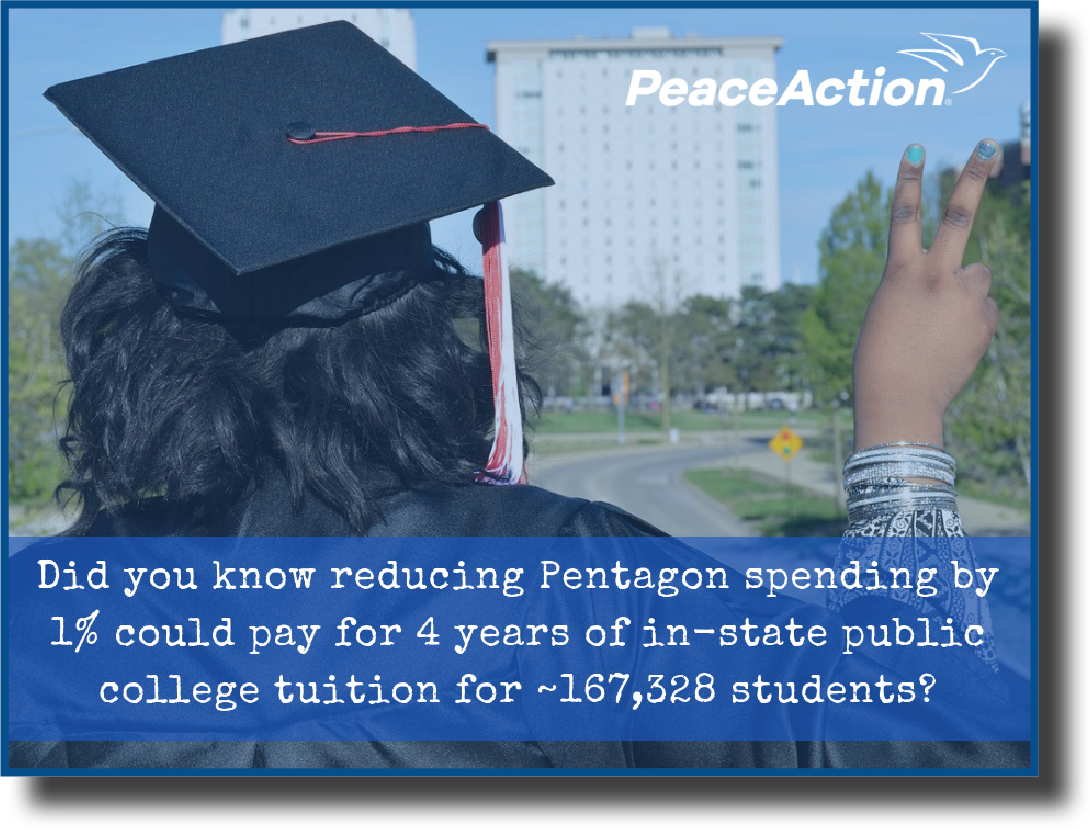 To afford this, we must realize that spending more than the next seven countries combined on our military does not offer the greatest return on investment for our collective security. We must demand to know—when told that we can’t afford real investments in healthcare, in education, in green energy—why the Pentagon can’t pass an audit, or why they buy parts from arms manufacturers at as much as a 4,436% markup. If we hope to meet the security challenges of our time with any measure of success, we must tackle wasteful Pentagon spending and take a more holistic view of our security. To reorient our nation’s spending priorities 20 leading organizations, including Peace Action, have joined in a national coalition calling for a cut to Pentagon bloat by at least $200 billion annually. Redirecting $200 billion from the Pentagon each year would free up $2 trillion over the next decade to address our country’s wider human security needs. Even with these cuts, the Pentagon’s budget would remain more than enough to keep America safe with spending at a level well above post-World War II historical averages.
To afford this, we must realize that spending more than the next seven countries combined on our military does not offer the greatest return on investment for our collective security. We must demand to know—when told that we can’t afford real investments in healthcare, in education, in green energy—why the Pentagon can’t pass an audit, or why they buy parts from arms manufacturers at as much as a 4,436% markup. If we hope to meet the security challenges of our time with any measure of success, we must tackle wasteful Pentagon spending and take a more holistic view of our security. To reorient our nation’s spending priorities 20 leading organizations, including Peace Action, have joined in a national coalition calling for a cut to Pentagon bloat by at least $200 billion annually. Redirecting $200 billion from the Pentagon each year would free up $2 trillion over the next decade to address our country’s wider human security needs. Even with these cuts, the Pentagon’s budget would remain more than enough to keep America safe with spending at a level well above post-World War II historical averages.
Action Steps for a Progressive Foreign Policy
- Support cutting at least $200 billion from the Pentagon budget to support human needs.
- Support the Congressional Progressive Caucus’s People’s Budget, a budget that more accurately reflects our nation’s priorities.
- Support the elimination of the Overseas Contingency Operations (OCO) budget, a Pentagon slush fund that serves as an end run around mandatory budget caps and that operates without the accountability and transparency as baseline Pentagon spending.
- Reject all PAC contributions from the defense industry and weapons manufacturers.
A Peace Voter’s Question for the Candidates
Do you support reducing Pentagon spending by at least $200 billion, a level well above our nation’s post-WWII average, so we can fund real investments in human needs?

Nuclear weapons pose an existential threat to humanity. As long as nuclear weapons exist, there is a risk, even a likelihood, that they will be used again. Should nuclear weapons ever be used again, the risks of catastrophic escalation would be great. Should one nuclear attack lead to others, a nuclear winter could ensue, risking billions of casualties and a global environmental crisis. Therefore, we must make the global abolition of nuclear weapons a top national security priority. Until we achieve this goal, we must work to reduce the immense threat posed by nuclear weapons.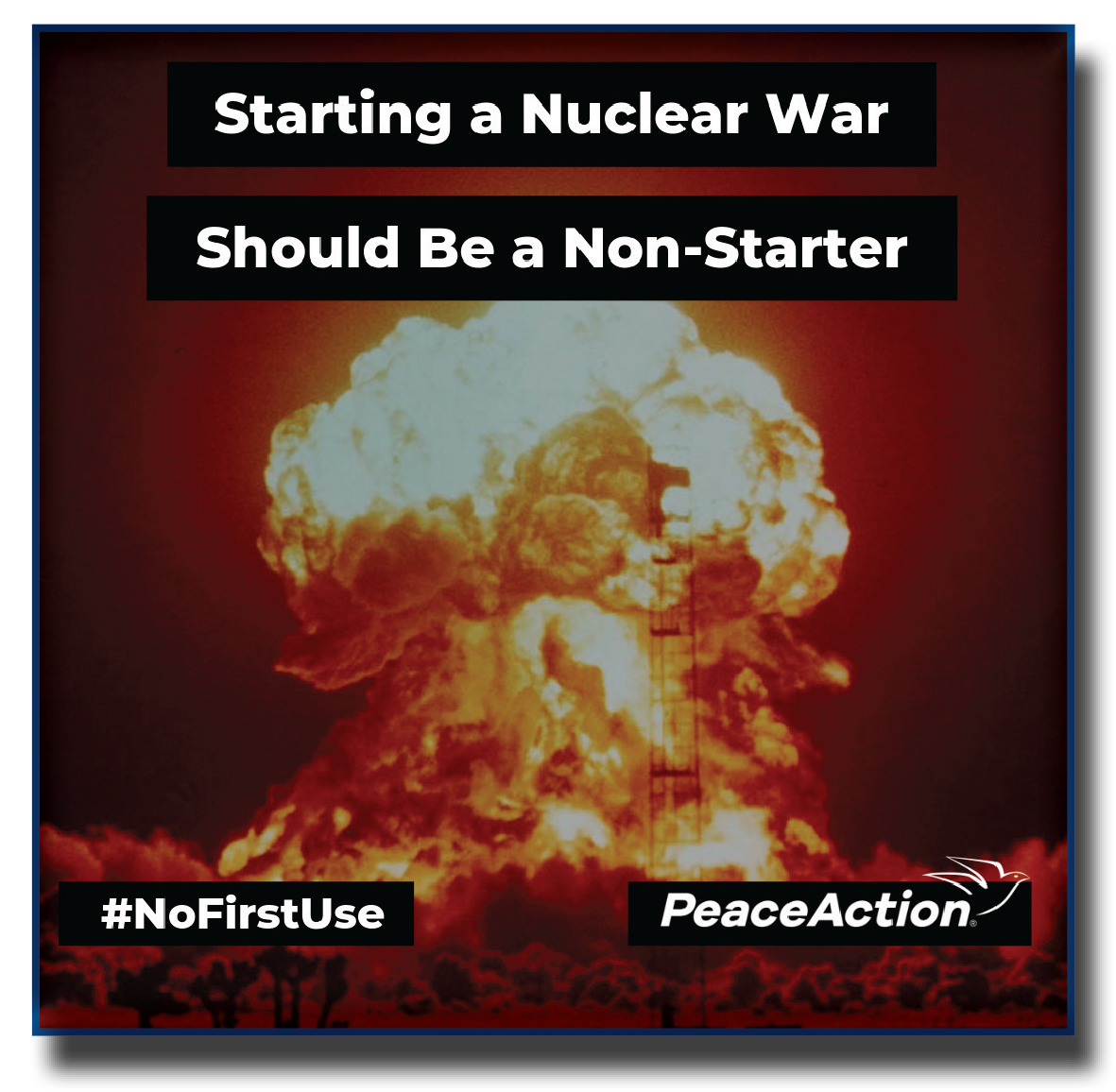
We must pursue diplomacy to prevent the spread and proliferation of nuclear weapons, and diplomacy with nuclear-armed nations to reduce and eventually eliminate the world’s nuclear arsenals. We must cease and desist investments in new nuclear weapons with new, destabilizing capabilities designed to make these weapons “more usable.” We must avoid the risks associated with a new nuclear arms race, from the increased risk of nuclear war, to the squandering of nearly $2 trillion over the next three decades that could otherwise be invested in real security and human needs. That amount could cover the investment gap for large parts of our nation’s failing infrastructure–schools, airports, railroads, high hazard dams, landfills, canals and ports combined. We must end Cold War-era policies that keep our nuclear weapons on hair-trigger alert, allowing for their launch within a matter of minutes, and that empower one person to unilaterally order a nuclear first strike. We must also adopt new policies to reduce the nuclear threat, such as a “No-First-Use” policy to assure the world that we will never again use nuclear weapons first in a conflict.
Action Steps for a Progressive Foreign Policy
- Support the pursuit of a nuclear weapons free world.
- Support the adoption of a No-First-Use policy regarding nuclear weapons, and restrictions on the president’s authority to launch a nuclear first strike without a declaration of war from Congress.
- Support deep cuts to nuclear weapons spending and oppose destabilizing and costly expansions to our nuclear arsenal and weapons capabilities, including the deployment of “low-yield” nuclear weapons.
- Support international arms control agreements including the Iran Nuclear Agreement, the INF Treaty, the New START Treaty, the Nonproliferation Treaty, and the Treaty on the Prohibition of Nuclear Weapons.
A Peace Voter’s Question for the Candidates
Do you support a “No First Use” nuclear weapons policy where the United States would commit to never initiating a nuclear exchange?
A majority of the world’s nations support the international Treaty on the Prohibition of Nuclear Weapons. Do you believe the U.S. should work to come into compliance with this treaty as soon as possible, and would you support any unilateral reductions in the U.S. nuclear arsenal in order to advance that goal?

The Trump administration is charting a course for war with Iran. The growing conflict with Iran is the predictable result of Trump’s ill-advised decision to pull out of the Iran Nuclear Agreement. On top of needlessly ramping up tensions with Iran, the move struck a blow to U.S. credibility on the world stage, imperiling current and future diplomacy and alienating the U.S. from the other parties to the agreement–China, Russia, France, the U.K. and the E.U. Since that calamitous decision, the administration has worked to cripple Iran’s economy, threatened Iran with “unrelenting force” should it or any of its proxies attack U.S. interests in the region, and nearly launched an unauthorized attack against Iran.
Just as the Bush administration relied on unsubstantiated claims of ties between Iraq and al Qaeda to build its case for the Iraq War, the Trump administration has been promoting incredibly dubious claims of collaboration between Iran and al Qaeda. The administration has also refused to rule out using the 2001 Authorization for the Use of Military Force (AUMF) to attack Iran, raising the prospect of war with Iran without any debate or authorization from Congress.
We cannot allow this administration to drag the U.S. into another catastrophic war of choice in the Middle East. Diplomacy is the only viable option for addressing concerns over Iran’s activities. The U.S. should immediately return to full compliance with the Iran Nuclear Agreement in order to protect its gains and open the door for further dialogue with Iran.
Action Steps for a Progressive Foreign Policy
- Oppose the use of military force against Iran.
- Support efforts to protect the gains of the Iran Nuclear Agreement, including the U.S. returning to full compliance with the agreement.
- Support diplomatic strategies to address concerns over Iran’s activities.
 A Peace Voter’s Question for Candidates
A Peace Voter’s Question for Candidates
What would you do to prevent war with Iran? Do you support reentering the Iran Nuclear Agreement and pursuing other diplomatic approaches to address tensions with Iran?

Yemen’s tragic war and the bloody Saudi-led bombing campaign has been aided by the U.S. every step of the way. Since 2015, U.S. weapons, intelligence and political support have enabled a vicious bombing campaign that has targeted schools, school buses, weddings, funerals, hospitals and market places. The Saudi-led coalition has even targeted Yemen’s food and water systems, in a deliberate effort to starve the people of Yemen into submission. As a result, some 24 million people depend on humanitarian aid, and over 14 million are on the verge of starvation. According to the United Nations, the effects of war have been near apocalyptic for the people of Yemen–roughly 233,000 people have died in the war, with 102,000 combat deaths and 131,000 indirect deaths owing to lack of food, exposure and preventable disease, among other causes. Over 85,000 children have died of starvation since the start of the war. Meanwhile, extremist groups have taken advantage of the power vacuum and of U.S. involvement to expand their reach. To top it all off, despite deep U.S. complicity in this conflict, Congress never authorized U.S. involvement, making it unconstitutional .
Ending U.S. support for the war will accelerate an end to the war itself by pressuring the Saudi-led coalition to negotiate in good faith. The president has sided with the arms industry and the Saudi Crown Prince over the will of a majority of Congress and the American people in order to keep us militarily involved in Yemen. We must end this catastrophic, unconstitutional war.
Action Steps for a Progressive Foreign Policy
- Oppose arms sales and military support for members of the Saudi-led coalition in Yemen.
- Support diplomatic efforts to end the war in Yemen, and increased humanitarian aid to address the worst humanitarian crisis on the planet.
 A Peace Voter’s Question for Candidates
A Peace Voter’s Question for Candidates
U.S. military support for the Saudi and UAE-led war in Yemen has facilitated war crimes and helped give rise to the worst humanitarian crisis on the planet, yet it was never authorized by Congress. Do you support ending all arms sales and military aid to members of the Saudi and UAE-led coalition in Yemen?

 War with North Korea would put millions of lives at risk, and could lead to a catastrophic nuclear war. It is simply not a viable option for any nation involved. The Trump administration’s “maximum pressure” campaign has harmed the general population of North Korea, compounded tensions and repeatedly undermined progress in negotiations. Diplomacy is the best and only viable option for addressing concerns over North Korea’s nuclear weapons program. Diplomacy with North Korea requires patience, confidence-building measures, and a reciprocal approach to negotiations rather than the all-or-nothing approach the Trump administration has emphasized. Rather than seeking to dictate terms, the U.S. should follow the lead of our ally South Korea in its efforts to end the Korean war and advance a lasting peace on the Korean Peninsula.
War with North Korea would put millions of lives at risk, and could lead to a catastrophic nuclear war. It is simply not a viable option for any nation involved. The Trump administration’s “maximum pressure” campaign has harmed the general population of North Korea, compounded tensions and repeatedly undermined progress in negotiations. Diplomacy is the best and only viable option for addressing concerns over North Korea’s nuclear weapons program. Diplomacy with North Korea requires patience, confidence-building measures, and a reciprocal approach to negotiations rather than the all-or-nothing approach the Trump administration has emphasized. Rather than seeking to dictate terms, the U.S. should follow the lead of our ally South Korea in its efforts to end the Korean war and advance a lasting peace on the Korean Peninsula.
The ongoing state of war between the U.S., South Korea and North Korea is the root cause of the nuclear crisis, explaining North Korea’s desire for a nuclear deterrent. Diplomacy aimed at curbing North Korea’s nuclear weapons program therefore should include the pursuit of a formal end to the Korean War through the signing of a peace agreement.
Action Steps for a Progressive Foreign Policy
- Support reciprocal, staged diplomacy with North Korea and the pursuit of a peace agreement to formally end the Korean War.
- Support efforts to reunite Korean Americans with family members in North Korea.
- Support humanitarian operations in North Korea by working to strengthen humanitarian sanctions exemptions and rescind travel restrictions to North Korea.
- Oppose further sanctions and punitive measures while talks are ongoing.
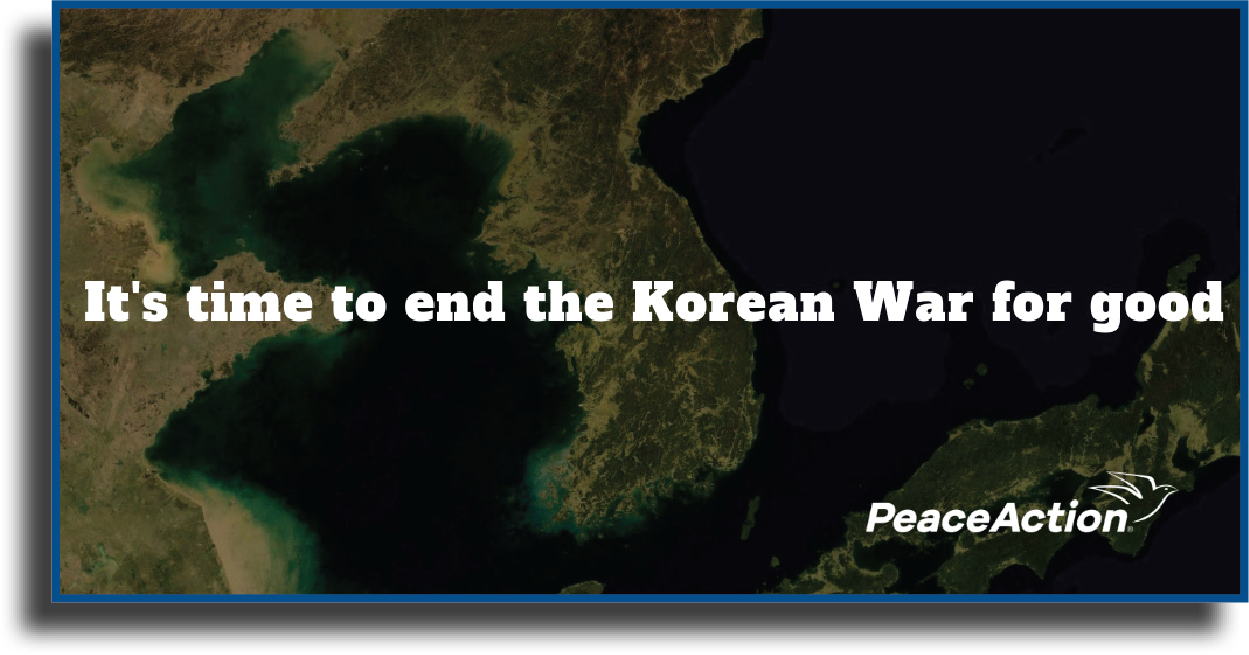
A Peace Voter’s Question for the Candidates
Do you support the pursuit of a peace agreement to formally end the Korean war as an essential step towards addressing concerns over North Korea’s nuclear weapons program?

U.S. military intervention in Venezuela would be disastrous, likely including either a significant aerial bombing campaign or a full scale ground invasion. Thousands of civilians could be killed. Any intervention not carried out in self defense or authorized by Congress and the UN Security Council would also violate U.S. and international law. Moreover, a majority of Venezuelans oppose U.S. military intervention. If U.S. policy is truly to support the Venezuelan people’s right to self determination, military intervention is clearly not the answer. Sanctions are similarly not the answer to Venezuela’s problems. U.S. sanctions have significantly contributed to the humanitarian crisis, and are also opposed by a majority of Venezuelans. Instead, the U.S. should support a diplomatic process led by Venezuelans to resolve the political standoff and avoid war. The U.S. should also increase humanitarian aid for Venezuela while avoiding cynical ploys to politicize the delivery of aid.
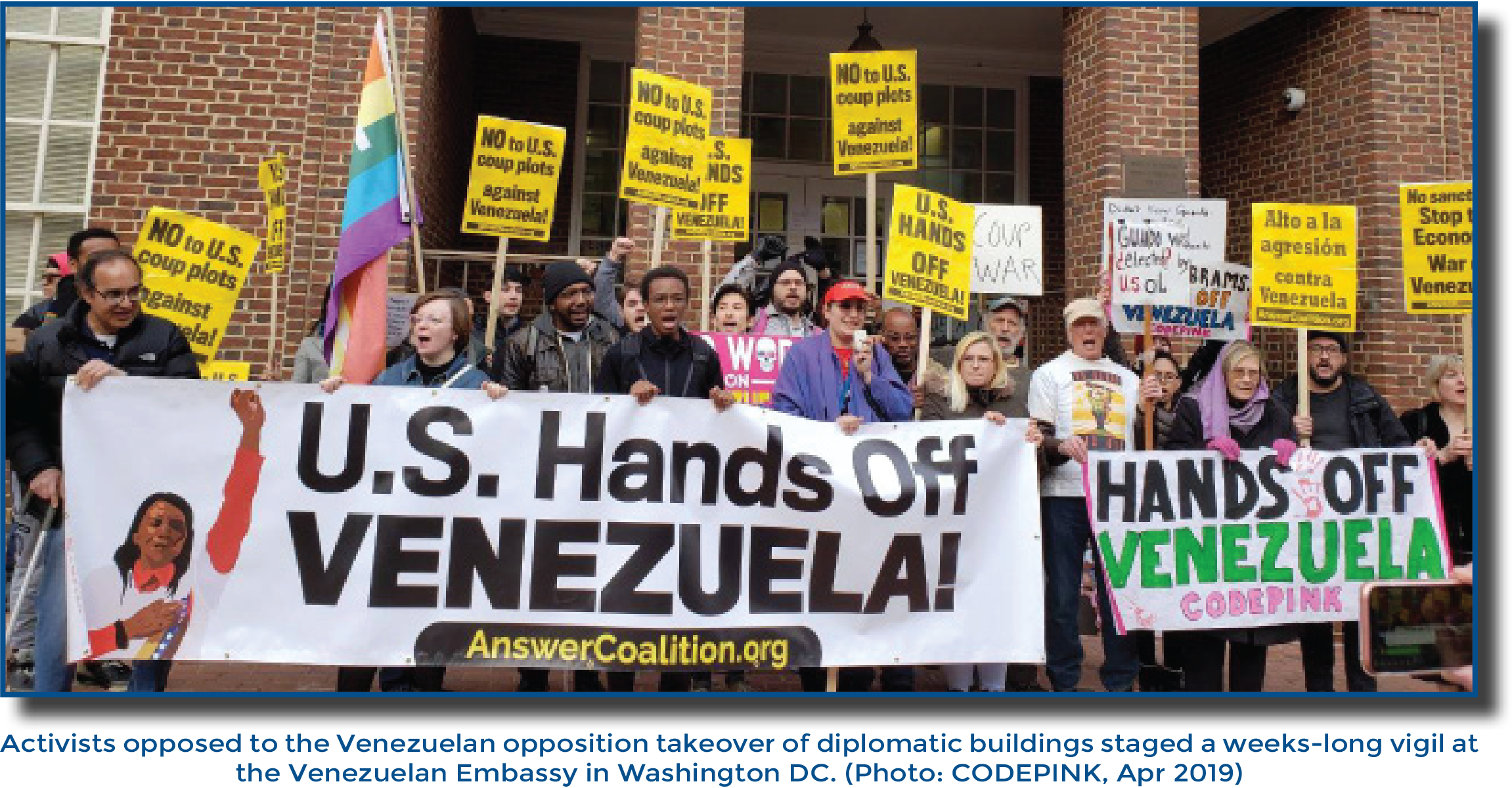 Action Steps for a Progressive Foreign Policy
Action Steps for a Progressive Foreign Policy
- Oppose the use of military force against Venezuela without congressional approval.
- Oppose sanctions that harm the general population of Venezuela.
- Support a diplomatic process led by Venezuelans to resolve the political standoff and avoid war.
- Support increased humanitarian aid for Venezuela, and oppose the politicization of humanitarian aid.
A Peace Voter’s Question for the Candidates
Do you oppose U.S. military intervention in Venezuela and support a diplomatic approach to resolving tensions in the region?

 If we want a paradigm shift in our nation’s foreign policy we will need to provide adequate resources for strategies of diplomacy, development and humanitarian aid, strategies that have the power to prevent and end wars, and to heal the wounds of war. Every threat we face—from nuclear threats to climate change, from conventional and cyber warfare to violent extremism—can be addressed more effectively with rigorous and principled diplomacy than with threats, bombs, and bullets. By prioritizing these approaches, we can tackle the problems of violent extremism and war at their source, rather than just reacting to their symptoms. We can offer people opportunities that war often suppresses or extinguishes by making investments that go beyond meeting basic needs like food and water. By investing in education, healthcare and poverty alleviation, we can help create stronger communities around the world and foster a sense of belonging to our global community, a sense we must embrace if we are to meet the challenges of our time with any measure of success.
If we want a paradigm shift in our nation’s foreign policy we will need to provide adequate resources for strategies of diplomacy, development and humanitarian aid, strategies that have the power to prevent and end wars, and to heal the wounds of war. Every threat we face—from nuclear threats to climate change, from conventional and cyber warfare to violent extremism—can be addressed more effectively with rigorous and principled diplomacy than with threats, bombs, and bullets. By prioritizing these approaches, we can tackle the problems of violent extremism and war at their source, rather than just reacting to their symptoms. We can offer people opportunities that war often suppresses or extinguishes by making investments that go beyond meeting basic needs like food and water. By investing in education, healthcare and poverty alleviation, we can help create stronger communities around the world and foster a sense of belonging to our global community, a sense we must embrace if we are to meet the challenges of our time with any measure of success.
Action Steps for a Progressive Foreign Policy
- Support increased funding for the State Department, humanitarian aid and development programs.
- Support the application of good-faith diplomacy—not threats, scattershot sanctions and military posturing—to address conflicts in Syria, Iraq, Afghanistan, and Yemen, and tensions with Iran, North Korea, and Venezuela.
- Support a dramatic increase in the number of refugees we welcome into the U.S.
A Peace Voter’s Question for Candidates
Do you support dramatic increases in State Department and humanitarian aid funding in order to develop and prioritize diplomatic and humanitarian strategies to solve foreign policy challenges?

Israelis and Palestinians deserve a just peace for all. We must stand against violence and the loss of life regardless of the source. Unfortunately, unquestioning U.S. support for Israel’s military has directly contributed to much of the violence. U.S. military support for Israel has helped Israel defend itself from external foes, but it has also facilitated Israel’s human rights abuses. Israeli security forces receiving U.S. arms and military support have used live ammunition against protesters, killing hundreds and injuring thousands. The dead and injured include hundreds of children. U.S. law prohibits military assistance to any country that engages in a consistent pattern of human rights violations. The United States can use its leverage as Israel’s largest supporter to press for rights reforms that will immediately improve the daily lives of Palestinians while providing the foundation for a long-term peace agreement.
To promote peace we must also oppose policies fueling a growing humanitarian crisis: Israeli settlements in the occupied Palestinian Territories, home demolitions and displacement, exploitation of resources, and blockades that have created dire human suffering for millions of Palestinians.
Action Steps for a Progressive Foreign Policy
- Restore and fully fund humanitarian aid to the West Bank and Gaza.
- Oppose Israel’s longtime policy of allowing civilians to settle in the occupied Palestinian Territories.
- Support diplomatic efforts to advance peace and human rights in Israel and the Palestinian Territories.
- Make the disbursement of U.S. military assistance to Israel contingent on compliance with U.S. human rights laws. Investigate possible violations by Israel of U.S. laws.
- Oppose legislation that seeks to criminalize support for the Boycott Divestment and Sanctions movement, or that otherwise infringes on rights to free speech.
A Peace Voter’s Question for the Candidates
Do you oppose the Israeli violations of Palestinian rights in the Palestinian Territories and would you support measures to hold Israel accountable for those violations?

The existential threat posed by climate change requires bold action… now. Successful action to address climate change here in the U.S. must not only address our addiction to oil, but also our habit of using military force to gain leverage over fossil fuel resources. We need to recognize that the climate crisis is attached at the hip with endless wars, driven partially by a focus on regions rich in fossil fuels, and the current U.S. war economy. At the same time, U.S. military strides the globe with a huge carbon bootprint as the world’s largest polluter. Today’s Pentagon is a polluting juggernaut built for the challenges of the 20th century. It’s responsible for 141 Superfund sites worldwide and uses more oil every day than the country of Sweden. Yet it sucks up over half of our nation’s discretionary resources. Meeting the climate challenge will require us to take a deep look at our spending priorities. We need to ramp up investments in clean energy and green jobs. Our endless wars not only cost us lives, and cause the bloated Pentagon budget to grow, those conflicts suck up diplomatic energy that could go toward addressing the global challenge of climate change.
The Green New Deal offers an ambitious set of policy prescriptions designed to meet the unprecedented challenges posed by climate change with empathy, dignity, and forethought. But time is short, which means we need to put those prescriptions into practice without delay. We also must work to ensure that these policy changes occur globally, which means mobilizing collectively with the world’s nations to confront the greatest challenge humanity has ever faced.
Action Steps for a Progressive Foreign Policy
- Support the Green New Deal.
- Support a package of regulations and wide-scale investments that move the U.S. to 100% clean energy and transportation systems to achieve net-zero climate pollution economy-wide.
- Support diplomatic efforts to drastically reduce global carbon emissions and achieve a global transition to renewable energy. Efforts should include, but should not be limited to, re-entering the Paris Climate Agreement and meeting or exceeding that agreement’s commitments.
- Reject PAC contributions from the oil, fossil fuel industry.
- Work to reduce the U.S. military’s disproportionate level of greenhouse gas emissions.
A Peace Voter’s Question for the Candidates
How will you use U.S. diplomacy to rally the global community to address the global climate challenge?
Will you cut wasteful Pentagon spending to free up funds to address the global climate challenge and to help stop this existential threat to human life on this planet?
Are you registered to vote? Click here to double-check or register.
Want to vote from the safety of your home? Click here to get your absentee ballot!


